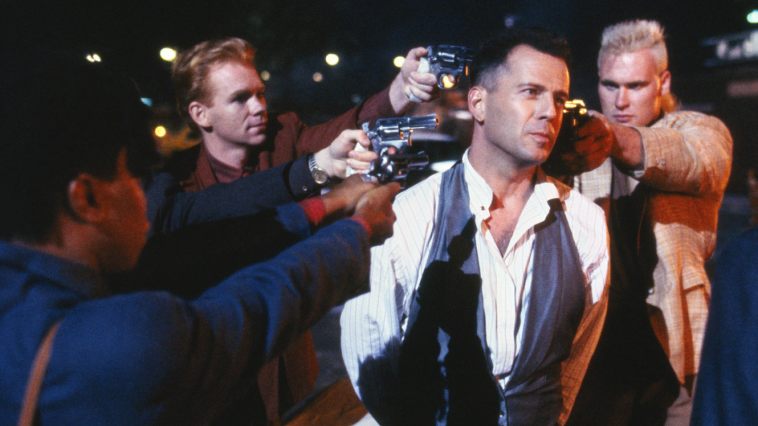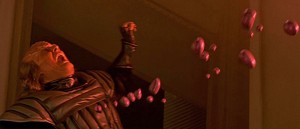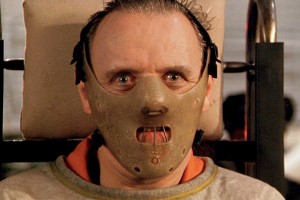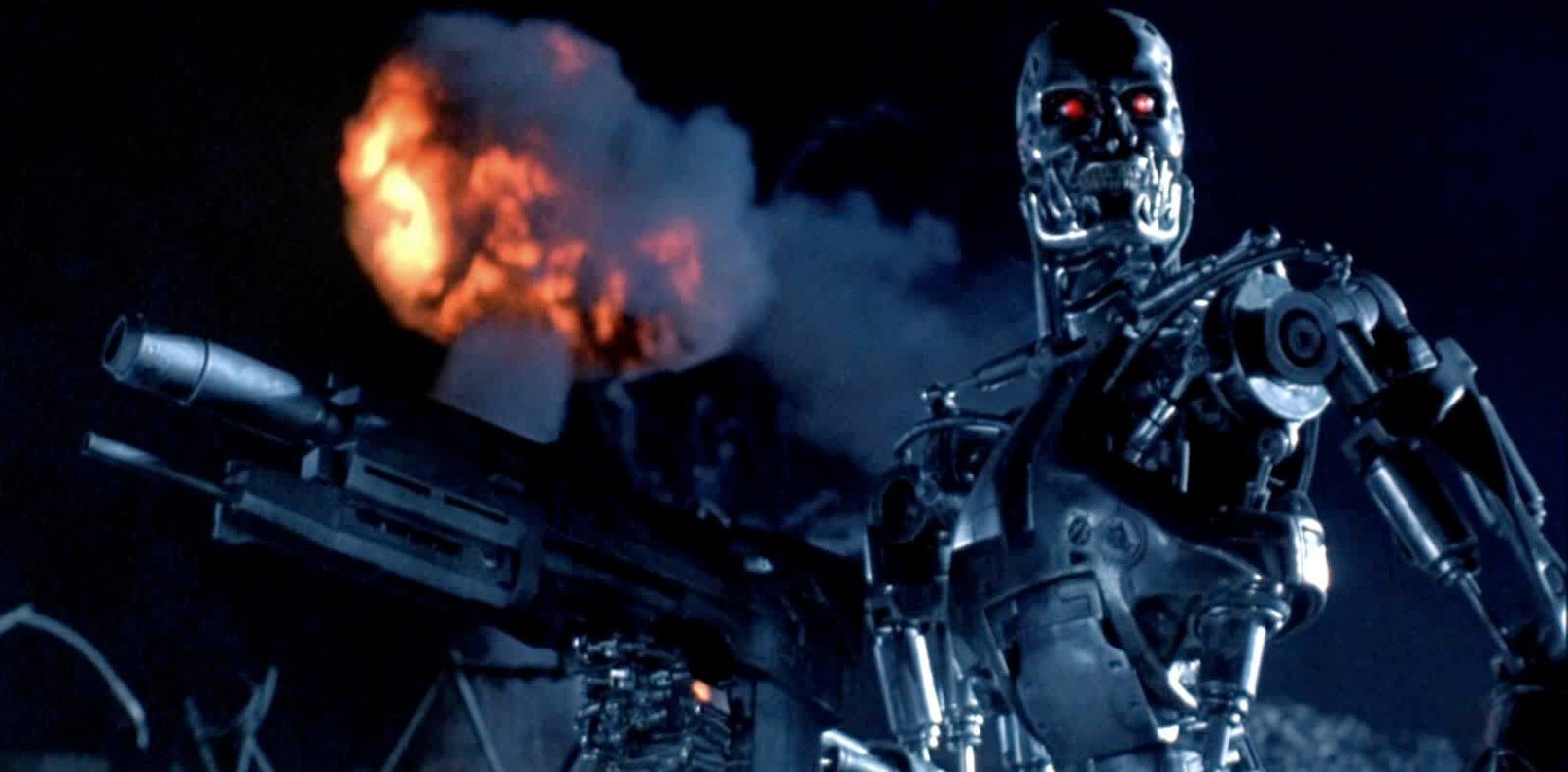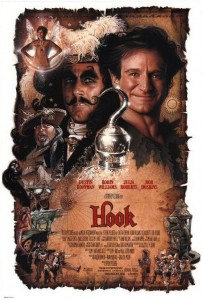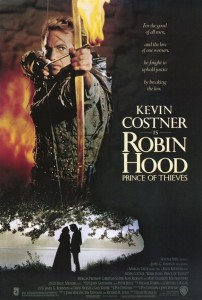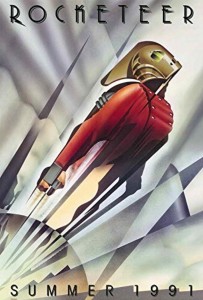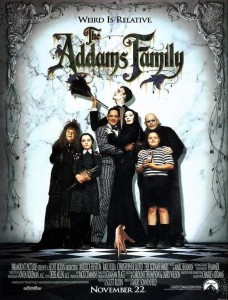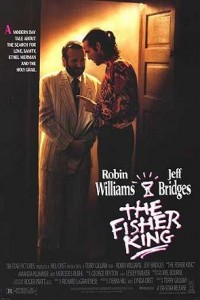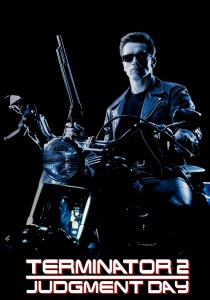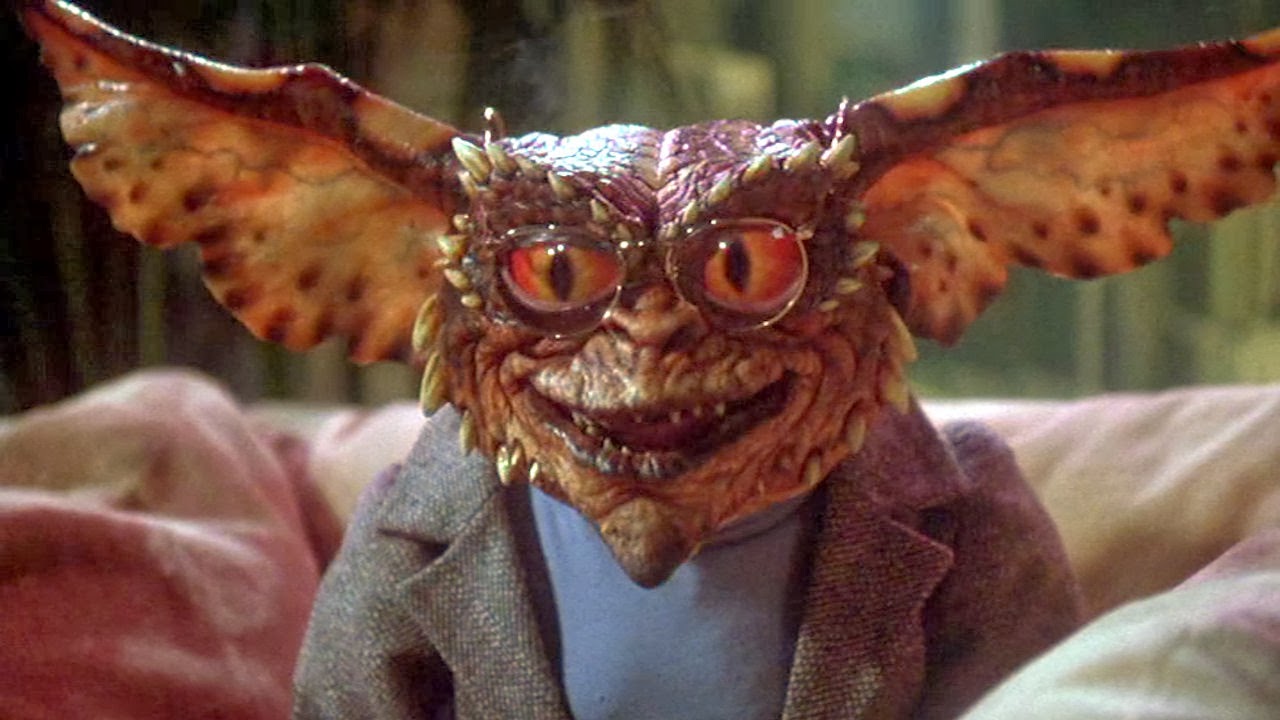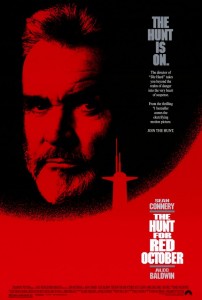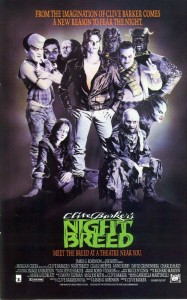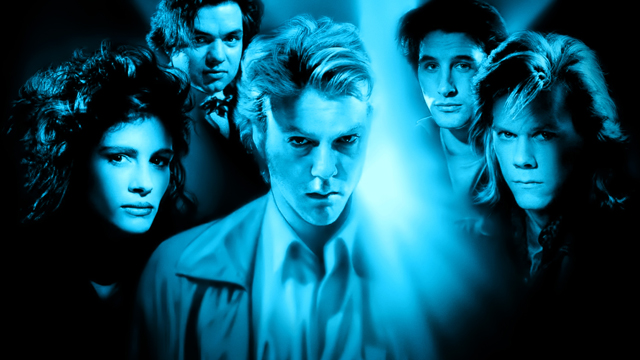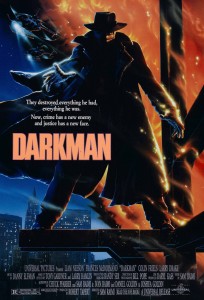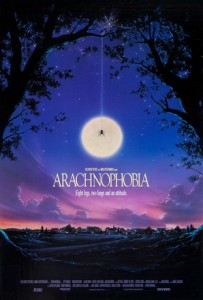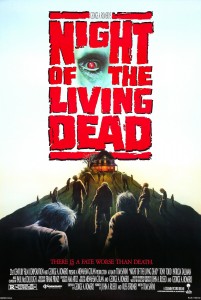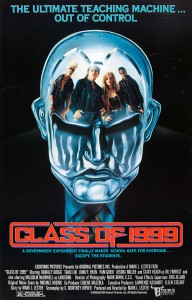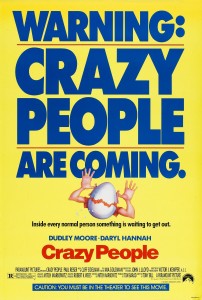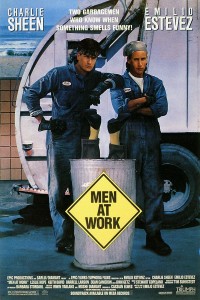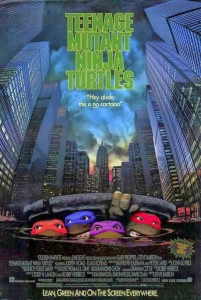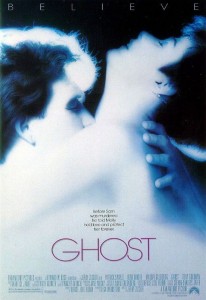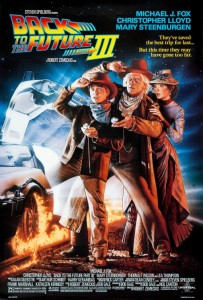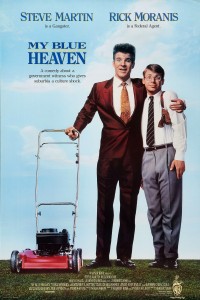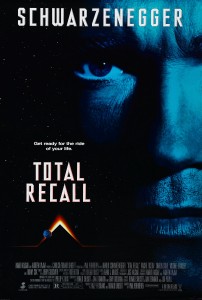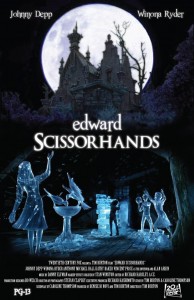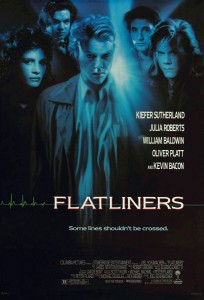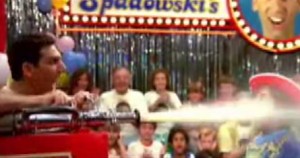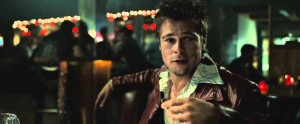This was the bigger list for 1991…
I was surprised at 1991’s film experience. When compiling my movies of choice for that year, I said, “this list feels thin.” Then I looked at the number of films I saw that fell into the background. Admittedly, when you have a year with T2: Judgement Day in it… everything else sort of falls flat.
So, I present to you the films that fell under Ah-nold’s shadow and were either a good flick, just okay, or flat out terminated.
The Good, the Bad, and the Indifferent
- Nothing But Trouble (Bad): Dan Ackroyd plays a weirdo (one of his best numbers) and yet he still fails to save this film – even as the director. Digital Underground was called in to try and pull the film out of a tailspin, but it still crashed the film into the ground. If you must watch this one, inebriation will go a long way to surviving the experience.
- Teenage Mutant Ninja Turtles 2: The Secret of the Ooze (Bad): For as good as the first one was… just… no. Even if David Warner is in it, it does not forgive the presence of Vanilla Ice.
- Drop Dead Fred (Indifferent): A girl’s imaginary friend comes back in adulthood to cause trouble. Stuff happens, but it’s not memorable.
- What About Bob? (Indifferent): I like Bill Murray as much as the next guy. But this film wasn’t his best.
- Hudson Hawk (Bad): This is probably at that weird intersection of events that results in a guilty pleasure. Watch with beer and the full understanding that it’s not going to get better.
- City Slickers (Good): “Just one thing.” “Your finger?”
- Naked Gun 2 1/2: The Smell of Fear (Indifferent): OJ was in this as Northberg, so the trial hadn’t happened yet. It was funny, but ordinary.
- Bill and Ted’s Bogus Journey (Bad): As much as I love the first film (Bill and Ted’s Excellent Adventure, 1989) this follow-up is not required viewing. Just falls flat. Bogus is even in the title.
- Hot Shots! (Indifferent): I remember laughing, but none of the jokes.
- Doc Hollywood (Good): Michael J. Fox continues a general winning streak. Staple comedy stuff, worth a view.
- Harley Davidson and the Marlboro Man (Indifferent): Wow. Mom and Dad picked a racy film for a twelve year old’s birthday party. A cult classic for some, but T&A failed to cement this as a favorite.
- Highlander II: The Quickening (Bad): There should be only one.
- The People Under the Stairs (Indifferent): Another cult classic which was okay, but didn’t leave a lot of itself behind in my mind.
- Cape Fear (Good): De Niro portraying an unhinged stalker. Par for the course.
- My Girl (Indifferent): A coming of age story as I was starting to come of age, but what I remember the most is the young female lead blubbering about Macaulay Culkin’s glasses.
- Star Trek VI: The Undiscovered Country (Good): I’m not an avid fan of Star Trek. But, Klingon Shakespeare and Pepto Bismol blood in zero-G is cool. That alone beat the hell out of Star Trek V: The Final Frontier (1989) in which ‘god’ wanted to bum a ride.
Filling In the Blanks
I also found that I missed a LOT of stuff from this year. I mean, a whole shelf of VHS practically fell through my field of view and I didn’t grab enough. Many of my peers will no doubt school me for this list as it includes some of the really iconic movies from the year of 1991. Some I missed because I wasn’t old enough, others wouldn’t have passed my parents’ muster, and others just wouldn’t have registered as important to me at the time.
I can’t blame outside sources for everything though. I’m a grown man and I’ve been able to watch any damn movies I please. Shit, I worked at a Blockbuster Video in college. Free rentals! I had tons of opportunities.
So, with great shame (not for all, but definitely some), I note the following gaps in my film knowledge, and mark them for future consideration.
- The Silence of the Lambs: Apparently my dad and my grandmother (yes, my dad and his mom) watched this together and determined the film was great. And, that it was wholly inappropriate for just about everyone else in our family. Serial killers aren’t a favorite topic for me, but this is critically acclaimed stuff. I have to remedy this gap, and soon.
- The Doors: I didn’t know who the hell Jim Morrison was when this came out, so I didn’t care at the time. Given an updated appreciation of music that preceded my birth at a later stage in life, this seems like a no brainer in hindsight. While not a huge fan, I appreciate what I do know and would love to learn more.
- New Jack City: I’m not sure I was even aware of this film growing up. But, it’s Wesley Snipes and I know a lot of folks who really liked this film.
- Career Opportunities: Jennifer Connelly. I’ll admit this freely. It’s the only compelling reason I have to visit this. I’m comfortable with this.
- Backdraft: I have a friend from college who watched this movie like it was holy scripture. It helped his dad was a fire chief I suppose. Never made it to my VHS player though.
- Jungle Fever: I missed everything Spike Lee produced in my youth. He was ‘controversial,’ and as a result his films never got through my house’s front door or garnered much attention. Mom and dad of course had their own picks come through that could have been considered controversial – I just don’t think they were ready themselves for the raw nerves that Lee hit with his films. A lot of white, suburban parents probably weren’t, which was probably one of Spike Lee’s points in making the films he’s known for. Regardless, the topic of sex as a focal point in any story was enough to keep this film out of my reach as I was still too young to watch this at the time Jungle Fever came out. The good news is my parents have become wiser with age, and as noted above… I can watch anything I like nowadays.
- Boyz n the Hood: Much like the above, except replace sex with gang violence.
- Point Break: Yes, yes. I know, I know, I’ll get on this. It didn’t seem like a big deal at the time.
- Dutch: This is a big favorite in my aunt’s family, but it never broke the barrier into my immediate family’s collection. We started watching it this Thanksgiving during dinner. But, as with any holiday event with my family, discussion was the main focus, not the film. Plus I had to leave earlier than expected. So I owe my cousin a viewing.
- Double Impact: Something with two Jean-Claude Van Dammes? Sure. Why not? Probably better than Timecop (1994), which we’ll get to soon!
- Barton Fink: It’s John Turturro and John Goodman. It seems like this is a no brainer. I came to love Turturro recently after watching The Night Of (2016) and O Brother, Where Art Thou (2000). I started streaming this recently on Netflix, but I have the attention span of a weasel on speed. I shall return to it with any luck.
- My Own Private Idaho: I always did like River Phoenix – Explorers (1985) was a regularly viewed growing up, later he was in Indiana Jones and the Last Crusade (1989), and then again in Sneakers (1992). Seems logical to add this film to the pile.
- Curly Sue: this is one of two remaining films (the other being She’s Having a Baby, 1988) remaining in my list of John Hughes directed films remaining to be watched. So, it has to happen.
- The Last Boy Scout: Bruce Willis action films are hard to turn down given my love of Die Hard (1988). And of course you have Damon Wayans who was on the rise at the time. But, then again: Hudson Hawk. Maybe it just felt bad to fully trust Bruce Willis in 1991.
- JFK: Back, and to the left. Back, and to the left. Back, and to the left. I know that much. So why not see the rest? Oliver Stone was a big part of the nineties, and honestly, I’m not sure I’ve seen any of his work.
So, Where Was I in 1991?
I was in my last two years of middle school. I’d finally started to come out of my shell the tiniest bit, though I was still just the nervous kid who was just good enough at talking his way out of having the shit kicked out of him by the worst bullies. I was discovering that in my school my social caste was low. Music kids at least had a clique to fit into, and I had long ago learned that I didn’t want to be with the in kids who had some byzantine requirements to run with them, one of which was abandoning the friends who’d always been there for me. My social circle had started to solidify and I was starting to feel a place where I belonged. My love affair with tabletop roleplaying games had also taken off, and I was running games of Robotech and Teenage Mutant Ninja Turtles with my friends. Seeing his son turn into a second generation geek, my dad stepped in to teach my gaming circle how to play Warhammer Fantasy Roleplay. Another older friend would run Dungeons and Dragons and Star Wars while TSR and West End Games were still a thing.
The political scene got weird that year. I remembered that we learned at scout camp, over breakfast prayer, that America had kicked off its involvement in the Gulf War that summer and that we needed to pray for our boys in the war. Later in the fall, I remember watching CNN announcing SCUD strikes out of Iraq and the reports of US Patriot Missiles that knocked (most of) them down. Just after Christmas, a lot of the hubbub about Russia and ‘the bomb’ started dying down as the Soviet Union fell apart. Or at least it felt that way at the time to a young kid who didn’t really grasp the situation. The resulting shitshow it set off would come much later.
I got my first example in huge flaming letters that year about racism, and that race in America was not a settled issue. If that sounds naive, it’s because I was. I grew up with kids of all colors and creeds in my classes, and I had parents who taught me that everyone had something to bring to the table regardless of sex or race, and that we all bled the same color. Everyone was the same inside and there was no good reason to discriminate. Sure, I’d seen a small number of racist kids, parents, and assorted asshats by then, but surely they were on the decline. All my teachers who taught the civil rights movement to us (mostly in February) said so. Sadly, especially when little kids are involved, teachers tend to gloss over or even lie about things. When Rodney King took a beating for the ages at the hands of the Los Angeles Police Department that year, everything changed. Someone had managed to film the whole thing with their camcorder, and that showed that the number of said racist asshats in our country was not exactly in decline. Far from it. It was all anyone could talk about for months. “Can’t we all just get along?” became a mantra heard on TV, on the radio, and on the lips of parties both sincere and mocking. This was also the year that some of my faith in cops as ‘good guys’ started to crumble as I learned about something most white kids didn’t experience: police brutality. It was an important lesson in corruption, racism, and authoritarianism, though I don’t think I could have vocalized it that well at the time.
But, like most twelve year olds… I mostly cared about Sonic the Hedgehog and my new Genesis game system I got for Christmas.
Oh, and a couple of great movies.
The Schlock
There weren’t a lot of good-bad movies to inspire me in this year for whatever reason, though there was a lot of schlock watched. Then again, there was a lot of it from the previous year, so this category gets a buy this round.
Somewhere In the Middle
Hook
When I watched it: 1991
It taught me: Wonder
Stars: ★★★
A lot of my friends go all-in on this movie and it’s a favorite of my girlfriend’s. I like it, though it’s not necessarily a personal blockbuster for me. There was a lot to like though.
The story centers around a successful lawyer, Peter. He has two kids, married a woman he loves, and by all means, things should be looking up. But, he’s starting to feel his age. He’s a burned out workaholic who’s barely able to see his kids; kids who are starting to resent him for it. When he goes to London to visit his wife’s ailing grandmother Wendy, his children mysteriously disappear and the story goes on to to transform into a story we all know: Peter Pan. This is because Peter is him, Peter Pan all grown up. The children have been stolen by none other than Captain Hook who as absconded with them to the Pirate Cove. He returns to Neverland to rescue his children with the help of his long forgotten gang of Lost Boys.
A big part of Hook’s success for me was that it opened up wonder in a way only big-budget special effects could. They were something amazing for their time – the special effects progressed rapidly in the nineties, and this was a showcase example. I remember how vividly the story was brought to life, how magical it all felt. It was everything you hoped Neverland could bring you.
Apart from that, it struck needed balances. A parent could watch it with their child, and each viewer got what they needed from the film. It was a rare instance of something with as much appeal for grown ups as it had for their kids.
The cast was also exceptional, with Robin Williams as peter, Dustin Hoffman as Captain Hook, Bob Hoskins as Smee, and Julia Roberts as Tinkerbell.
Robin Hood: Prince of Thieves
When I watched it: 1991
It taught me: The Devil Is In the Details
Stars: ★★★★
This is almost schlock.
The only things that got it out of that particular bucket, were its insane production value and top-notch actors. You have Morgan Freeman, Kevin Costner, Alan Rickman, Brian Blessed, Christian Slater, Michael Wincott, Mary Elizabeth Mastrantonio, and a cameo from Sean Connery (the most Scottish king of England you’ll ever find).
The story is familiar, just with none of the singing animals that my generation had come to expect from the story. Ultimately, the movie did have a fatal flaw: Kevin Costner. I’ve heard what everyone else heard: Costner was terrible at English accents… so he gave up and played it as straight as he could, rolling with his American accent instead. Regardless of that statement’s truth, no one else seemed to be phoning anything else in for their performances and honestly, Freeman and Rickman steal the show anyway. All it took was that one detail, Costner’s lack of Englishness, to get this film panned.
For a guy who’d later in his career be willing to take extravagantly expensive reshoots for his film Waterworld (1995) when he realized viewers could tell his hair was receding… you’d think Costner would have tried just a little harder. It could have made this into a film that could have really sold the classic tale. Even with Alan Rickman completely eating his lunch.
The Rocketeer
When I watched it: 1991
It taught me: Pulp; Art Deco; That I Still Love Jennifer Connelly
Stars: ★★★★
I remember my dad taking me out to see this. I don’t think we knew what we were gloing to get, though dad had a better idea than I did. This was as much a new hero movie for me as it was a harkening back to the two-fisted adventure tales of his very early youth. In we went with our tickets, and out we came with broad smiles.
The film is about a pilot who happens into a stolen jetpack designed by none other than Howard Hughes. He uses the pack to save lives and eventually draws the attention of Hughes (played by Terry O’Quinn!), the FBI, the thieves, and because it’s set in the thirties… the Nazis (punches incoming!). Adventure ensues.
I just remember getting so caught up in this film in terms of story and design. It taught me a fair amount about how adventure stories from the old pulp magazines worked. It also had just enough of the period’s flavor, such as Deco (used to great effect in the movie poster). If I had to go back and put my thumb on where my love of Deco came from… it may have fully bloomed from somewhere else, but there’s a good chance the seed was planted here.
Also Jennifer Connelley. ‘Nuff said.
The Addams Family
When I watched it: 1991
It taught me: Gallows Humor
Stars: ★★★
This is one of the earliest examples I can personally remember of the reboot boom of this decade. It was before I had learned to utter things like ‘Can’t they just leave [a cherished and loved childhood property] alone? They always wreck it!’ Because this film was friggin’ awesome.
I had initial doubts about it. But they all proved unfounded and it further developed my repertoire of morbid humor. The weird, the strange, the odd, and the ghastly mixed with spontaneous and razor sharp presentation and timing to make something you could laugh at again and again.
Looking back, I ought not be surprised. This had a fantastic cast. Raul Julia, Christopher Lloyd, Angelica Houston and Christina Ricci all came together for a film that simply could not be contained.
The Fisher King
When I watched it: Circa 1995
It taught me: Madness, Consequence
Stars: ★★★★
This is occasionally referred to as a comedy. Because hey, Robin Williams and Jeff Bridges! They’re funny! Especially Williams!
While there are funny bits in this… this is not a comedy. This is a drama. And a heart wrenching one at that.
It follows the lives of two men. One is a former shock jock radio personality whose career has imploded after his online antics bring about a tragic downfall. The other is a mentally ill man roving the streets of New York, believing himself to be a knight on a quest for the Holy Grail. They find each other after the ‘knight’ saves the disgraced radio star from a beating and progresses into a journey of self-redemption (and grail seeking), but it turns out their lives are tragically intertwined already without either one really knowing it.
Primarily, this was a great personal example of the thing most of our parents have the hardest time grinding into us as we grow up: actions have consequences. Sometimes the actions and consequences are simple, and sometimes they run deep and out of control. No one is exempt, and once the train leaves the station, it’s gone and out of your reach to control it.
Additionally, this is one of the first films I remember to effectively convey the condition of mental illness. It’s easy to just look at someone and say “diagnosis: crazy!” Crazy is a term so liberally applied that it’s almost lost meaning. But the way they approach Williams’ character displays the full depth of those deep in the grips of mental illness. Those stricken with madness can be charming, endearing, and forceful; but more often they are haunted or shattered. And to make it worse, you never really know what you’re going to get or how aprson so afflicted is going to act. The film put this right out where you could see it and get a good look. I try to keep what this film taught in mind when I portray a character who has something deeply broken inside.
The scene that sticks with me is the one in which Robin Williams is chasing after a woman played by Amanda Plummer whom Williams is smitten with. Following in her wake, he goes into Grand Central Station and has a delusion in which everyone in the station save for he and his muse are waltzing to music only he can hear. It is a fully fleshed out delusion with the magic that only well choreographed film can provide.
As we watched, my dad’s jaw kind of dropped and he stammered, “If that’s a delusion… I wanna have one.”
Personal Blockbusters
Terminator 2: Judgement Day
When I watched it: 1991, 1992 (Twice)
It taught me: Continuity; Post-Apocalypse
Stars: ★★★★★
I remember this very, very clearly. My parents debated taking me to this film – not just because of the violence and the graphic nature of the subject matter, but also because I’d not seen the first yet. Precisely because of the violence and graphic nature of the original.
Eventually, they decided it was okay, and just before I went to what passes for Space Camp in my home state, we went out to see it.
And my mind was blown. This is where I got my first big dose of the concept that is the post-apocalypse.
Burned out husks of buildings and cars. Skeletal remains scattered everywhere. Laser shots exchanged between bedraggled and desperate humans and gruesome cybernetic killing machines bent on the eradication of mankind. This was a film that planted a seed in me that will not yield. It sprouted roots in my spinal cord, extended tendrils through my arms, and made my hands type out stories of shattered worlds and desperate survival.
Yeah, it’s a big budget action movie that should have been nothing but schlock – the first one was schlock certainly, using (at the time) second-tier character actors (let’s be honest, at the time of The Terminator (1984), Schwarzenegger wasn’t called on for his acting chops). But this is James Cameron we’re talking about. And even in his early years, James Cameron did (and does) not fuck around.
The care and the detail that went into the film was something that really inspired something in me later as well – the concept of continuity carried out beyond the cursory. The mythos of the Terminator had been particularly well thought out concept in the original film, and they incorporated and advanced many details into the second that remained true almost seamlessly in its follow-up. There are things that in repeat viewing that have caused problems (why the T-1000 requires touch to replicate something when a full body scan is probably better; how a T-1000 with no biological components comes through a time travel machine that requires a living energy field for transit). But it still holds up remarkably well.
This film may indeed be the signature film of the decade – it broke the mold of what we thought we could do in terms of story, of special effects, of production value, and upped the ante on how to make not just profitable but great sequels.
So. Many. Movies…
Obviously, as stated in earlier posts, the lists I’m generating aren’t meant to be comprehensive in any other context but my own preference. I didn’t have the time, budget, or desire to see every film that was ever released in my childhood. Also, indie and international films didn’t always hit the radar back in the nineties. It’s all hard to collate, so, I’ll let you in on my insight of how I’m generating this stuff.
I’m pulling my lists of films from the ever popular site Wikipedia.org, specifically this main article on years in film (with a primary focus on America). It’s not exhaustive, but it breaks down into individual years and it’s a pretty good indication of the films I was going to be able to see as a young American. I get a lot of my confirmations on their data on film releases by double checking at IMDB given that film is what they do, all day, every day (I’d use it as the primary source, but their breakdowns are so comprehensive as to produce more noise than signal for a free account user at the least).
Given that, I’m going to miss some stuff (mostly international or indie) while also being able to see other films that I either didn’t know about or to use to build a backlog of stuff I’d love to see later. This is giving me a couple of other buckets to divide film into, hence this coda. I’ll be adding a coda to each year under the heading of The Cutting Room Floor that will evolve as the project does. In these codas I intend to address films I saw but wasn’t particularly moved by, a to-do list of unviewed film, and also tackle some things I noted about film in general that the era might have brought about (We’ll get to that in 1995 with Mortal Kombat)
The good and the bad, and the indifferent.
It’s obvious, but worth saying: not all movies move me or leave a huge impression. Some leave me with a bad taste in my mouth. The year of 1990 was no exception. So, I figured I should at least mention the films I saw that were either just a good way to pass the time, but not deep or personally moving; the films that were just terrible or poorly executed; or the films that simply left me flat.
- Ski Patrol (Indifferent): As noted earlier with Men At Work, movies hadn’t gotten all the way out of the eighties yet, and as much as I love wacky hijinks movies from the 80’s, this was just more of the same.
- Tremors (Good): This film was an example of the kind of weird monster films that came out of the eighties pushing their way into a new decade as well. It was good, but giant worms had already been introduced in Dune (1984) and… I got to this one way after it’s release when I was in college. It’s fun, but didn’t push me forward in any way emotionally or creatively.
- The Hunt For Red October (Good): This had a great cast and was kind of a political primer for me given I was pretty young when I saw it. I didn’t really understand the concept of defection when I first watched it in the nineties. It got better with age since I was a kid and makes much more sense as an adult.
- Joe Versus the Volcano (Bad): It’s a damning thing when you realize you remember almost nothing of a movie other than that you weren’t impressed. Maybe I’m giving it a bad rap, but the only joke I remember is Tom Hanks playing with rubber testicles, and even that was a kind ‘laugh once’ moment.
- Spaced Invaders (Indifferent): I remember watching it on cable to pass the time. The Donut of Destruction was funny, but it’s the only thing I remember.
- Bird on a Wire (Indifferent): I watched it on VHS with my parents I think, but I draw a blank when trying to recall it’s plot or how we could have been fooled into thinking Mel Gibson was a good person. It had birds and wires maybe?
- Gremlins 2: The New Batch (Bad): I was so psyched to see a Gremlins (1984) sequel. But it was by no means the sequel I wanted or felt I deserved. I can’t help but think of something my roommate said to me about Transformers: Dark of the Moon (2011) that pertained to this: “It was entertaining… dumb as fuck, but entertaining.”
- Robocop 2 (Bad): Don’t. Just don’t.
- Die Hard 2 (Indifferent): I don’t think the team behind this movie tried real hard when it came to this follow-up. The original was better in every conceivable way (in my honest opinion, Die Hard (1988) is the film from which all nineties action movies are cut). Most impressive moment was death by icicle.
- Problem Child (Indifferent): I remember a kid in a devil suit, but not much else. Even this might even be a memory of its lackluster sequel? It left that much of an impression. I didn’t even remember Jack Ritter was in this until I looked it up on IMDB.
- Young Guns II (Good): I am not certain I’ve ever seen this film all at once in a single sitting, but what I saw I remember liking. Oddly enough, I’d never even seen the first Young Guns when I saw this… and I’m not certain I have now either. The eighties are fuzzy memory territory in some ways.
- Duck Tales the Movie: The Treasure of the Lost Lamp (Indifferent): The movie was Disney so it was good animation, but I only remember it being an extended episode of the usual Duck Tales fare: Flintheart Glomgold and Scrooge McDuck fight a libertarian battle for treasure.
- Goodfellas (Good): This is no doubt going to come up as a sticking point knowing a lot of the people I grew up with and whom I met later in my life. This movie was critically acclaimed, dramatic, and had a great cast. Maybe I caught it late, but it wasn’t a life changer for me. Of course, The Class of 1999 made it in the main list, so clearly my taste is poor on it’s best day, but I’ve never claimed otherwise.
- Home Alone (Indifferent): I cannot help but think of how many times that Kevin killed those robbers under the rules of conventional reality and how he’d have ended up in juvie or tried as an adult on the count of his adorable and vicious sadism. Sure, they were trying to rob and kill him in as a comedic manner was as was appropriate, but… Jesus Christ Kevin. You are a monster.
- Misery (Good): I’d read the book earlier that year (my second King book – I have no idea what my parents were thinking). If anything blew my mind between the two, it was the book. Good casting for both main roles (James Caan and Kathy Bates).
- Look Who’s Talking Too (Indifferent): More talking babies. Meh.
- Almost an Angel (Indifferent): Crocodile Dundee is an angel. Needed more crocodiles. I remember it being fun but just okay.
- Kindergarten Cop (Good): This was one of the first films where they tried out comedy with Arnold Schwarzenegger. Maybe not his best, but still fun. Ferrets never bite.
- Dick Tracy (Indifferent): I didn’t really have an expectation going in, and I didn’t really have an opinion coming out. It wasn’t a bad way to pass the time and the makeup work was superb. It just… wasn’t a memorable film for me.
Filling in the blanks
Even twenty-seven years later (as of this writing), there are still films I’ve not seen from the nineties that I would like to get around to. I’m certain that many of them have already had their expiration dates well exceeded, but there are always films that will stand the test of time regardless of the eras they came out of. So here’s a list of films I still need to get around to.
- Nightbreed: This was on my shelf for years on VHS, a freely given cassette from a colleague of my father’s. She’d given it to me in my first year at college after finding out that I was growing into an appreciation for horror films (once I got out of my parents’ house, the horror titles started rolling in). I am still recommended it today. In fact, I think it’s streaming now, so perhaps this gets visited as soon as today.
- House Party: This never really looked great as a kid, but it might have had something to offer.
- Pretty Woman: Totally missed this one, which was understandable. A movie that admitted that prostitution was a thing and actually focused on it probably wasn’t something my parents were in a rush to put in front of me. I’m not really a Julia Roberts fan either. But, it is arguably one of the iconic films of the decade, so I should at least give it a go.
- Cadillac Man: It’s Robin Williams. I like Robin Williams.
- Days of Thunder: NASCAR racing is boring to me, but a lot of people seemed to like this film.
- Pump Up the Volume: This film had no appeal to me as a youngster, but pirate radio is kind now of interest to me (radio as a science is something I’m now fascinated with in general). Prime Christian Slater territory as well.
- Hardware: I caught snippets of this post-apocalyptic title when I was a kid. I remember I started watching it on streaming recently but got sidetracked. I never got back to it, but it looks like nerd catnip for me.
So, Where Was I In 1990?
I can’t really start talking about the films from 1990 that made me who I am without giving you a starting point of who I was and what was going on around me as well.
I wasn’t all that old, not even a teenager yet. I had a lot of experience with movies though. I’d grown up on Disney cartoons like everyone else. In fact, I’d just been to Disney World and had a chance to go to Star Tours, the Indiana Jones Stunt Show, and got to even climb into the Toon Patrol vehicle from Roger Rabbit and see how they made Honey I Shrunk the Kids. I’d seen Indiana Jones and the Raiders of the Lost Ark dozens of times, and Indiana Jones and the Temple of Doom a handful of times (I was less excited about the banquet scene and the heart-ripping and the death trap full of bugs). The Star Wars Trilogy was my religion at that point,
I was still kind of shy at that point, despite having re-united with a childhood friend who was just as extroverted as I was introverted. I wasn’t thin, but not fat, and I had only the growing understanding of the world beyond the suburb I was raised in. I got picked on pretty frequently but had found refuge in people like me in the music program.
There was news about some far away place called Russia (who 80’s action movies taught me were bad hombres), and also a place called Kuwait was starting to brew up trouble and the adults were nervous about it. Apart from that, I wasn’t really aware of much else in the world other than my friends and the RPG games we’d just discovered and the comic books we liked.
And for film, well… this was a big year for me.
The Schlock
Anyone who lived through the nineties will tell you that there were a huge amount of films that, while not very good, were for some reason compulsively watched despite being of very low quality or just bad acting and plot.
I was not immune to these films.
Like I said before, I’ve never been accused of having particularly great taste, but I like what I like (and continue to do so). So with that said, let’s scrape the bottom of my personal barrel.
Oh, and before we go on, spoilers ahead. These movies are over 20 years old, but I always have someone telling me I spoiled something for them. So, consider this your warning.
Darkman
When I watched it: Circa 1990
It taught me: Revenge; (Bad) Biology and Chemistry
Stars: ★★
One of my best friends was absolutely fascinated by Darkman. This was a movie that taught me about a whole lot of things, some good, and some bad.
It was the first time anyone had ever explained the biological concept adrenalin to me (which I remembered vaguely had something to do with Darkman’s ‘powers’ – I honestly can’t remember if this is right). The big thing though was that Darkman was a scientist who’d invented lifelike artificial skin. It was flawed though, the skin only lasted 100 minutes in direct light though, thereby restricting it’s use. While he was making a breakthrough in his lab however, he was the victm of arson. The villains who’d left him for dead in the crime left him to burn alive, but he survived, as did his notes for the synthetic skin. It left him permanently scarred, but his synthetic skin is of use to cover his ghastly face. He goes on, using the skin to imitate people who can get him close enough to get revenge on the criminals who destroyed his life. This is almost all I remember of the film apart from the villain declaring he had nine more points to make after cutting off some dude’s finger.
I remember Darkman being less of a hero and more of an unhinged guy who’d experienced near death, then got a mad on to kill people who’d done wrong by him.
Revenge turned into a theme for some of my stories and characters later as I grew into my own kind of storyteller, especially the darker ones, and Darkman helped set some of the tone for some of these writings.
I have no clue why my father felt this film was okay for me to watch when I was twelve. The acting isn’t particularly great and it’s lack of substance wasn’t followed up even with enough flash to fill in the gaps. I’m also sure that Liam Neeson really wishes this film wasn’t on his resume as much as Bruce Campbell probably likes to point it out.
Arachnophobia
When I watched it: Circa 1990
It taught me: Fear
Stars: ★★
Arachnophobia, I want to be clear, was not a great movie in my opinion. It’s not even one of my favorites. But it was good at one thing that it baked right into the title, even if it said it in Greek.
The big takeaway from the films was phobia. I don’t personally suffer from a fear of spiders – I am the chief bug killer/remover in my home (it’s the flying bugs that freak me out). But this film was good at dialing up the creep without resorting to showers of gore. I knew tons of friends though, especially my relatively few female friends at that age, who cringed at just the name of the film. But, this was one of the first films I’d seen where I was learning about creep factor.
The part that remains with me after all of these years is a dead couple (victims of poisonous spider bites) on their couch with spiders crawling into and out of their noses and ears, nesting, cocooning, and feeding off of them. Extra points for the hero taking out the queen spider with a nailgun.
Extra terror from the spider love scene as well.
Night of the Living Dead (Remake, Directed by Tom Savini)
When I watched it: Circa 2000
It taught me: Fear (this will be a recurring theme)
Stars: ★★★
In my first year of college, the same friend who’d obsessed over Darkman gave me my first ever VHS copy of the original Night of the Living Dead (1968). It scared the living shit out of me in 1997 but I could not look away. I’d seen Dawn of the Dead (1978) and Day of the Dead (1983) – most of them anyhow, I was still squeamish when I saw them at around age fourteen and would make it a point not to watch the gory bits.
While I was living at home with my parents, Night of the Living Dead, a remake of the sixties classic, came on late night on HBO. Helmed by special effects master Tom Savini, he was the right guy for the remake. I started watching around eleven o’clock and could not sleep until about four o’clock that morning. The movie was great, if schlocky, but this is often a side effect of a movie that features Tony Todd (whom I still get excited to see in any given film). It was not a perfect remake (it is a rare thing indeed to have a remake be better than the original) but it had enough shifts to make it unique and enough tone to keep it honest to the spirit of the great granddaddy of modern zombie films.
Also, the film had a great reversal of gender expectations. The final farmhouse survivor is a woman as opposed to a man, and that woman kicks ass. Further more, she goes on to survive through to the credits, whereas Ben (the only character to make it through the night in the original) lived only long enough into the morning to be shot by a human ‘mistaking’ him for a zombie in broad daylight.
The Class of 1999
When I Watched It: Circa 1998
It Taught Me: (Bad) Future Forecasting/Cyberpunk
Stars:★★★
The Class of 1999 came on HBO on a late night. I remembered hearing about it from a my Darkman evangelist friend who’d said that it was really campy but worth a watch (he recently informed me that this memory is false, but I swear it was him). The concept was that a military technology contractor decides to offload their life-like android battle droids to a failing public school in order to keep the juvenile delinquents in it in line.Things go badly when the teachers start killing problem students and the student body gets suspicious.
It’s… a mostly awful movie. But I remember watching it and thinking ‘did we actually think we’d get this far, technologically speaking by now (the answer was yes, we’ll get to more of that in 1991)?’ It also was a film that, while not executed particularly well, scratched a developing itch that turned into a preferred focus: cyberpunk. Soulless corporate entities, advanced technology, combat zones (referred to as ‘free fire zones’), and anti-establishment themes, they’re all here. I list this film anytime cyberpunk cinema comes up, for good or ill (we’ll talk about cyberpunk more in 1995).
Then there’s a pretty obvious (and dramatically hyperbolic) display of the fears of the era: rebellious youth, street violence, gang warfare, drug use, crime, unchecked technology, corporate influence. Humans are really bad at making predictions, and sci-fi films depicting the future are often a good example of this. I’m reminded of this every time I watch Blade Runner (1982) or Escape From New York (1981). This film is the classic example of the future taken to the nth degree. The film just took all of those fears and turned all of them up to eleven (or as high as they could given budget).
This film did get a couple of known names though, particularly Pam Grier as one of the android teachers; and Malcolm McDowell as the Principal of Kennedy High School. Plus, Head Like A Hole by Nine Inch Nails is a part of the soundtrack.
Somewhere In the Middle
Somewhere between the schlock and the pinnacle were the films that were too polished and had too many big names to be schlock, but weren’t quite good enough to be the cream of the crop. Here, you’ll find the sleeper hits, the almost-made-its, and the rabble of films that had a small nugget of glory to find amid the dross.
Crazy People
When I watched it: Circa 1995
What it inspired in me: Irreverence; Brutal Honesty
Stars: ★★★
Late in the nineties, I would begin my career in graphic design. That career started in advertising. It’s really the most basic thing designers get employed for. Not creativity, not honesty or passion. They pay designers to pump out ads to make product manufacturers rich. Our ‘art’ doesn’t really enter the picture.
Dudley Moore’s character, a highly paid ad man, has realized this in spades in this film, and he’s burning out. In a last fit of desperation and sudden enlightenment, he starts presenting wildly inappropriate but intensely honest ads to his bosses. The powers that be for his firm promptly push him into a mental hospital until such a time that he can work out his issues and return to work. What he finds though is incredible inspiration. He embraces the insanity of his fellow inmates and makes even bigger, better, more inappropriate, and (frankly) awesome ads containing honesty and brutal candor along with his fellow patients. And it takes off. I still remember and spout off some of the slogans on occasion:
- “Metamucil: take it, or you’ll get old, get cancer, and die.”
- “Volvos: They’re boxy, but they’re good.”
- “Jaguar: sleek and smart. For men who would like handjobs from beautiful women they hardly know!”
- “Sony: Because caucasians are too damn tall.”
- “Forget France. Come to Greece – we’re nicer”
Now, it took some time for this to really sink in, and until I took that first ad job in the late nineties, I don’t think I could have fully understood everything Crazy People had to offer. But, sometimes to get the biggest laugh, you have to find a place inside of you that simply doesn’t care about politeness. You have to present the truth (or at least a highly recognizable perceived truth) in such an obvious way that you cannot help but laugh. This movie taught me that in a big way.
Men At Work
When I watched it: Circa 1990
It taught me: Gallows Humor; Irreverence
Stars: ★★★
Men at Work is one of those movies that you go back and look at it and it’s just… ridiculous. I remember the plot being about two garbage men (Emilio Estevez and Charlie Sheen) witnessing shady dealings between a few people one of them was stalking, then finding the body of one of the conspirators on their route in a can the next day. They’re afraid of being framed for his murder and stash the body, using it as leverage to clear their names and put some bad dudes behind bars.
Movies hadn’t really progressed beyond the eighties yet in a lot of ways.
But it wasn’t the plot that got me. It was the humor. It was pretty irreverent even for a PG-13 film. But it was also dark. I’d learn over time more about ‘gallows humor’ but the film contained what might have been my earliest memorable example, the moment where Keith David (portraying a borderline crazy Vietnam Veteran) sees the body and says “Aww, lookie here. Looks like somebody threw away a perfectly white boy.” It floored me. It was distasteful but hilarious. I could not stop laughing.
Yes, I know that this line was a paraphrase of a line in Better Off Dead (1985), but I saw Men at Work first.
Teenage Mutant Ninja Turtles
When I watched it: 1990
It taught me: Adaptation
Stars: ★★★★
I saw this in the first couple weeks it was in theater, then watched the shit out of it on VHS right up through college until the tape warped.
To say I was a fan of Teenage Mutant Ninja Turtles as a child would be an understatement. I followed it and revered it in the same way I did Indiana Jones, Star Wars, and Ghostbusters. It colors a lot of my experience but only until later would it really settle in why I liked it so much. Some friends back then were actually disappointed. But what about Krang? And the Technodrome? Aren’t the Foot robots? And where were the Mousers and Baxter Stockman?
I knew though.
When I love a thing, I dive deep into it. I learn everything I can, including origins. And those original comics… they were dark as hell. Splinter raised four, straight-up murder turtles. Those katanas and sais weren’t for defense, they were for killing men, particularly of the clan of ninjas that killed Master Splinter’s sensei. They had the honor of bushido, but their purpose was grim and violent. For a story containing something as ridiculous as mutant animals with ninja training, the original story was compelling, and gritty, and a lot better thought out than the cartoons. And it was this story they went with for the film.
I kind of enjoyed being in on what had happened. What had been adapted wasn’t the terrible cartoon (I loved it back then but it does not hold up) or Archie comics. It adapted the original comic books. Of course, they had to make sure that they could tie it in with the Teenage Mutant Ninja Turtles that was more family friendly to get that sweet G and PG cash that mom and dad would shell out (pun not intended) in order to keep their kids distracted for a couple hours. And for some reason, it penetrated my brain early that sometimes when you made a movie adaptation, things might have to change. Might. I was still mostly a purist when it came to my favorite properties. Still am. But, this was the first time I could see a compromise in adaptation absolutely working.
Also, this is one of Sam Rockwell’s first movies (he plays the lead street kid who reveals the Foot’s hideout).
Ghost
When I watched it: Circa 1991
It taught me: Genre Blending; The Afterlife
Stars: ★★★★
If you’ve read anything I’ve written or read anything on this blog at all, really, you know that ghosts are high up there on my lists of favorite subjects. But this wasn’t the kind of ghost movie I was expecting as a kid.
Ghost is about a successful banker, Sam, with a bright future and a loving wife, Molly. Things go horribly wrong when Sam is killed in a robbery gone wrong before Molly’s eyes. But it doesn’t end there for Sam. He is stuck to wander New York City as a ghost. In the process of learning the rules of his new existence, he discovers that his best friend, Carl, arranged his death-by-robbery to cover up an embezzlement scheme Sam was close to learning about. Plus, Carl is putting the moves on grieving Molly. With the help of a formerly fake, but now totally legitimate, spirit medium, Oda Mae, Sam protects Molly from the events that have unfolded from his death.
This is a movie about both love and revenge from beyond the grave, a favorite trope of mine (We’ll get my favorite example in 1994). It fascinated me though because to me, this was kind of a new idea for me – that you could do both at the same time with depth and relative complexity (though I couldn’t have verbalized it as such at the time). Of course, this isn’t uncommon. It’s a tale as old as time: revenge for lost or stolen love. But this was where I think it clicked for the first time.
The other big thing for me was that this film had a depiction of the afterlife that I really latched onto. That there were special people who could really talk to the dead. There were both demonic and godly forces that had visible levels influence. Possession. Ghosts weren’t some kind of terrifying monster, but rather human beings who found themselves in supernatural circumstances. And thinking about it from the other side was something this film solidified for me: a ghost story from the perspective of the ghost.
Additionally, I love Vincenr Schiavelli’s homeless shade. He summed up the wretched existence of a ghost: damned for eternity to simply watch all of the things he can no longer have.
Personal Blockbusters
Now here’s the main event. These are films that either made me what I am today or moved something in me to a significant degree. You’ll hear me quote these films regularly, see their DNA in my writing, or catch me rewatching on a regular basis. They don’t have to be your favorites, but they are some of mine.
Back To the Future, Part III
When I watched it: 1990
It inspired me through: Continuity; Scope
Stars: ★★★★★
I’m not a particularly big fan of time travel these days, but I loved all of the Back to the Future movies from start to finish (I won second place in a company-wide BTtF trivia event against stiff competition).
The series has its problems, but its heart was in the right place. Time travel is something that is so hard to do well. And while I always find something to pick apart in them, the BTtF trilogy was one of the better ones.
One of the things I love was the sense of continuity maintained through all of the films and the way history (and the future) kept repeating itself. I loved how the sets for Hill Valley evolved from era to era, from 1888 to 1955, to two separate 1985s, to 2015. Back To the Future, Part 3 was simply the extension of it, a resolution to the films I’d loved in my very early childhood. They managed to tell a story which for me (at the time) didn’t have anything so glaring plot-wise that it knocked me out of the flow. A good story should always do that.
And then there was the scope of it all. It’s a story that spanned over a century but that occurred over the course of a couple of weeks for Marty. It showed me how big you could let a story be if you wanted to.
My Blue Heaven
When I watched it: 1990
It taught me: Timing; Comedy; The Open Ending
Stars: ★★★★★
I sometimes have trouble grasping why My Blue Heaven wasn’t a bigger success. My parents are of the opinion that it didn’t make it big due to the film’s less than sterling portrayal of Italians (though I feel it wasn’t targeted at Italians in general so much as our stereotype of the Italian Mafia). But regardless of how it was received by critics, it is one of my all-time favorite comedies.
It covers the story of a New York mafiosi turned snitch, Vinnie. He moves out to the suburbs of San Diego and goes into witness protection where Barney, his handler, tries in vain to assimilate him into his new life. When Vinnie discovers the witness protection agency has placed a few other fellow mafiosi in the ‘burbs with him, and that the support checks from the Feds will end after his trial, he decides to start a new crime wave with his regained friends. Hilarity ensues as he intertwines himself into the lives of his FBI handler, the handler’s friends, former mobsters, and the local community.
The movie has some of the best comedy deliveries I can think of, and the jokes continue to make me laugh to this day. My family quotes it regularly. It delivers at the exact most timely moments that it can, from Vinnie showing two kids how to pick someone’s pocket while standing for the National Anthem (“You always gotta watch your wallets, kids”), to his deadpan deliveries to Hannah, Barney’s love interest (“The shoes… the shoes are tragic”), the jokes have the best timing you can ask for. It had a great cast as well,with Steve Martin as Vinnie, Rick Moranis as Barney, and Joan Cusack as Hannah.
But, the real sticking point for me is the ending. Vinnie, at every turn, engages in criminal activity. He never really seems to regret anything he does and can explain his way out of anything. Close to the end of the film he’s accused of stealing from kids as well as the larger community. It starts when Vinnie’s crew knocks over a truck and ends up getting nothing but a bunch of empty water dispenser barrels which Vinnie then repurposes as money collection jugs ostensibly for the local little league team. The local kids put everything they can into the fund raiser, as do their parents and the rest of the town, getting Vinnie rather a lot of untraceable cash. However, this money eventually does end up funding the Fryburg Turtles, netting them all new equipment, a brand new professional stadium, and snazzy uniforms. But, the question we always debate between my mom, dad, and myself is did he spend the money that way when he got caught to save his own skin… or did he mean to do it all along? Because, for all of his criminality, he actually bonds with Hannah’s kids who are on the little league team. When he’s teaching the kids how pickpocketing works, he’s teaching them how not to be victimized. He looks out for the kids in ahis own weird way. So is he a scuzzy thief in the end, or did he actually turn a new leaf and finally give back?
We still can’t find the answer. And I love it.
Total Recall
When I watched it: Circa 1993
What it inspired in me: A Fascination With Mars, The The Open Ending
Stars: ★★★★★
As a kid, I grew up on the stories my mom would tell me about the moon landing. I watched the shuttle program go through it’s highs and catastrophic lows. I looked at the pictures that came back from Viking and Voyager. Everything I’d seen told me one thing: someday, I was going to live and work in space.
Obviously, this isn’t going to happen. We seem intent on strangling NASA in its sleep, and until we find a way to make a buck in space by actually sending people up in orbit, there’s gonna be no calls for the kind of advances we’d need to live and work in space.
Lucky for me, 1990 brought me Total Recall.
Now, scientifically accurate it ain’t. Physics takes a powder in this film. The realities of gravity and what loss of it does to bone density is thrown out the window. But, you don’t need this. You can explain away a lot of the science with the old Asimov arguments (sufficient technology being indistinguishable from magic) and a good dollop of Phillip K. Dick’s sci-fi sensibilities. Because it’s not really about the tech so much as it’s about living on the frontiers of both space and reality.
Total Recall covers the life of Douglas Quaid, a nobody on Earth who dreams of going to Mars. He knows he’ll never afford to go to the bustling colony there, but he thinks he has the solution. Against the wishes of his wife, he goes to a business called Rekall, a company that can create realistic false memories to implant in your brain. They can take you to the most exotic locations, experience the most thrilling adventures, and to ultimately have the best experience money can fabricate. It goes sideways however when he signs up for the super spy trip: an implanted memory program in which the person travels somewhere as a spy, has James Bond styled adventures, and returns back to normal life. Trouble is… he really is a spy and his work-a-day life is an implanted memory! Or is it? The film concludes exactly the way that the trip is pitched (Quaid goes to Mars, discovers alien technology being suppressed by the local corporate concerns, kills a whole lot of people, and transforms Mars’ barren climate into one capable of sustaining human life), but it’s left vague as to whether or not Quaid actually travels to Mars or if it’s all in its head.
Personally I think it really happened – in the process of the unfolding events, Quaid kills his wife, takes down a corporation, and changes the status quo on Mars too drastically. Rekall makes its money based on their clientele never catching on that Rekall implanted the memories – more real than the real thing is their ethos after all.
But watching this movie in my teens, I just loved their depiction of life on Mars. I wanted to check into the Hilton there and feel the alien rock under my hands. I wanted to see the barren yet awe-inspiring vistas of the surface of mars. I wanted to have the technologies seen (even if Johnny Cab was kind of disturbing). It set the tone for what I thought the future could be like – even though now I know I’m never gonna get it.
Edward Scissorhands
When I watched it: 1991
What it taught me: Inversion of Expectations; Stories Don’t Always Have Happy Endings
Stars: ★★★★★
I remember being bummed out when mom brought Edward Scissorhands back home from the video store. I don’t know what I would have preferred in it’s place, but I was disappointed. Likely this was because my sister seemed to really want to see it on account of Johnny Depp.
I was an idiot.
This has been a movie that has stuck with me throughout the years. With every viewing I pick out something else that I hadn’t noticed prior. Especially in retrospect I can look back and see so much of the realities of human nature that the film plays like a fiddle. It’s Frankenstein and the early Sixties thrown in a blender with knives, then turned on at the highest setting.
The story covers the manufactured creature known only as Edward. Made by The Inventor in a castle looking over a Leave It To Beaver styled suburb. He is built piecemeal over time and trained by his creator to be a caring soul. But, before he could be completed, The Inventor dies, leaving Edward with only a series of shear blades configured into a facsimile of hands. Alone and scared of the town below, Edward remains in the castle until he’s chanced upon by a pathologically nosey but caring Avon lady who takes him home with her. Edward meets her family and does his best to assimilate into the outwardly prosaic suburb. His ghastly appearance and threatening looking hands keep the neighbors at bay at first, but many come to like him. Soon however, human nature asserts itself. Just as Edward starts to open up and try to please the townfolk, people make their own plays at taking advantage of his naiveté, unusual skills, and his newfound fame. It ends just like you’d expect it to after a series of mishaps, bad calls, and ultimately violence. Edward is forced back into seclusion where he lives on, apart from the town.
It’s… really the only way the story could end. Humans make shitty neighbors for anything else that isn’t like they are. Even when humans face other groups of humans that are only a little different, sometimes it isn’t good enough. The fear of ‘the other’ is as old as the species, and someone like Edward was doomed from the start. It’s a melancholy thing that I drew from the film. Humans are the real monsters, and, sometimes, things end less than well for all parties concerned. The town lost an amazing talent and exceptionally sensitive member. Edward loses the only family he’s ever known. People get hurt and die. The principals all go back to their corners. They carry love and experience and good memories, but also have those facets covered by a pall of regret, misfortune and pain.
Just like real life.
This film makes me cry every time I watch it. I never felt like I fit in myself as a kid. I was a nerd who read books when the other kids were playing football. I had thick, Coke bottle plastic glasses. I was scared of everything, and as a result I was shy. I’d have killed to have had a castle to myself away from everyone else. So, I could relate to being thrown into things I didn’t ask for when I filmed this. I had been thrown into many things as a kid that I didn’t really ask for. Some I liked, others I didn’t, but I saw a lot of myself in Edward. Thankfully, I never had his unique problems or faced an utter witch hunt against me, but there’s something utterly relatable that strikes an sympathetic chord, even today.
Flatliners
When I watched it: Circa 1997
What it inspired in me: A fascination with the afterlife
Stars: ★★★★★
I got to this film late, as I did with most horror movies (apart from my parents’ objections, I was also scared of everything as a kid as noted above). It was the college years when I finally scored a used VHS of Flatliners from the Blockbuster Video on South Street in Philadelphia.
The film centers on the ambition of a young medical student, Nelson. Wanting to leave his mark on medical history, he intends to kill himself in a safe setting using a chemical cocktail, then let himself be revived after being clinically brain dead for a few minutes. He intends to delve into death and bring back its secrets. He assembles a handful of similarly curious students to aid him in this endeavor, some more willing than others. His first ‘flatline’ is a success, but it turns out that death does not like to be cheated. He initially omits some of the negative experiences of the process of making contact with the afterlife -visions of his long dead dog, a shadowy and malicious child – and then his own personal demons physically begin manifesting. Soon, half of his fellow conspirators have also made the journey – longer ones – and they too are finding their pasts returning to haunt them, Nelson violently so, and he comes to the decision that the demons of their pasts must be repaid. Some will require steeper payments others.
This itches me right where the need for ghost stories generate scratches. The cinematography and presentation is amazing (this was before Joel Schumacher lost his goddamned mind on the set of Batman Forever and Batman and Robin) and I love the concept of young, foolhardy necronauts going the the real final frontier. The acting is good for a supernatural thriller and the cast was nothing short of great. Kiefer Sutherland, Kevin Bacon, Julia Roberts, Oliver Platt and William Baldwin fill out all of the students’ roles with an onscreen presence that holds together and sells the story.
The portrayal of the afterlife sticks with me after all these years and has ultimately colored my stories and to some degree my personal beliefs, strangely enough. I’ve imagined conceptually that the afterlife could possibly not be a heaven or hell visited upon us by benevolent creatoires of vile betrayers. Perhaps if there is an afterlife, it’s having to come to terms with the consequences of the things you did in life. Your torture or comfort will come from those things by your own judgement in someplace else with nothing to do but reflect on what you did with your time on earth.
Nope. Not talking about Portlandia.
I’ve been chewing on a lot of stuff in the back of my mind about who and what I am. Like everyone else on the planet, a large part of my personality and my mindset come from both environment and experience. As an American, this means a lot of things, but one thing really sticks out to me. And that thing is film.
I suppose other countries can be fixated on film, but when it comes down to it, have a look at some numbers. When Americans have some money in their pockets, they go to the movies. Even taking other factors into account from the data that’s out there (we are far from the biggest producers – Bollywood, China, and Nollywood beat us), but look at those numbers linked above from Wikipedia. At how much America feeds the industry through the box office. Out of the total budget spent on going to the cinema in the world, it looks like America outspends any other nation. (admittedly we put more production value in, inflating ticket costs, but I digress). We put up a third of the money at the box office that goes into the overall global film industry as of 2016. And that’s not even taking into account retail sales of home media, streamed or physical.
I can’t think of a single person I know here in America who doesn’t enjoy movies of one sort or another, and it seems we are born as film critics. We indoctrinate our young with Disney films and other kid focused flicks. The American film industry rakes in a huge amount of money from the kid movie market that always seem to pay dividends (if for no other reason than Mom and Dad want some time to keep their kids occupied). Then there’s the insane amount of money the industry pulls in on adolescents with PG-13 films, which outranked even the R-rated fare meant for people who get to typically spend their own money to see films. By the time the average American hits the R-rated scene (which most American parents seem to introduce their kids to early with moderate-to-low supervision by my experience) they have seen many, many films, and have probably watched their favorites dozens of times before going on to watch an even broader array of films. With the rise of streaming media and on-demand viewing, I can’t help but think the intake has grown to Spadowski levels of intensity.
I don’t necessarily think it’s even bad. Expression changes with the eras and their technologies and stories get told through the media that any given generation prizes. I imagine that folks in past times took their families to see minstrels, troubadours, and plays before we got out magic picture shows. TV and Film happen to be our expressive lingua franca now, and it is what it is.
Given all of that, I’ve put some thought into my own experiences in this American tradition of consumption.
While I have an incredible soft spot for the eighties, the films I watched then weren’t taken in full context. At seven years old, I did not understand the full nature of why Nazis were bad apart from their acting like villains (the full political and historical contexts would come with time and repeat viewings with my mom and dad). I didn’t get the underpinnings of societal and political realities while watching Iron Eagle (not that it had a lot of reality to begin with). Wargames was cool because there was a talking computer (I didn’t understand a lot of the rest of it at the time). The Blues Brothers was great because of the over-the-top hijinks and the swearing (swearing is super cool when you’re a kid). My brain didn’t really start picking up all of what films were laying down until I had at least a decade under my belt to start interpreting things like a well-adjusted human being.
And that meant it was the nineties when film really got in with a little more context to my brain. When I look back at a lot of my favorite films, I’m looking at the era of Bush the First and Bill Clinton. I’m talking about computer effects getting good enough that lawyer-eating dinosaurs looked wholly convincing. Where I was finally, legally, old enough to start going to R-rated films on my own without my parents to guide my interpretations. When I could start putting things together and seeing deeper meanings and layers of nuance (when I watched films with nuance).
Even more importantly, when I look back at the things that guide my hand creatively, so much of the influence on my work comes from some of my favorite films of the nineties. The Crow, Pulp Fiction, Sneakers, Clerks… the list goes on. It didn’t strike me until recently how much the films of the nineties influenced my emotional and creative palate. There’s tons of stuff I’ve drawn from without even consciously thinking about it.
So I want to go back, and I’d like to take you with me. You don’t have to wear any JNCO pants. No Fear need not apply. And for the love of god, you don’t have to have a chain wallet.
You can wear those if you want (if for some bizarre reason it makes you feel better), I won’t judge (much). If you have an unopened bottle of Jolt Cola or Zima… drink at your own risk.
And know that I will totally judge you for the Zima thing.
I only have a couple things to note:
- Any film in question had to come out of the nineties. As much as I love Blade Runner, and as much as I only eventually saw it for my first time in 1991 (a kind of fucked up thing to watch when you’re a tweenager), it was filmed in the eighties. This isn’t always about me seeing a film in the nineties, though it generally will be. Some nineties films I viewed after the nineties (Fight Club didn’t come to me until almost 2001 because, you know, college years are busy).
- Any film in question had to leave it’s mark on me. You aren’t going to see a comprehensive history here – just the films that made me sit up and take note for one reason or another.
- The films do not have to be, strictly speaking, good. Holy cow you’re gonna see some schlock come up here. I’m not saying I had, or even have developed since, great taste. These are films I watched that left an impression for good or ill. Teenagers and early-twenty somethings rarely have a refined palate and I am no exception.
- I will not be representing all genres and cultures because nineties Maurice was kinda limited. My film picks weren’t exactly groundbreaking or necessarily broad. I was a white kid from the ‘burbs. For half of these years my viewing habits were dependent on cash from my parents who decided what they felt was appropriate. I wasn’t all that high-brow and I hadn’t discovered a lot of films that were outside of my parents’ guidelines; broadening into international or minority film came later. College and experience started me down a broader pathin the late nineties, but that in some part came after the mid-nineties.
So come along with me if you like, to 1990 sometime in the next coming days. We’ll watch some movies and take a stroll down memory lane.
Archives
- May 2023
- July 2022
- June 2022
- March 2020
- November 2019
- November 2018
- September 2018
- August 2018
- January 2018
- December 2017
- November 2017
- August 2017
- July 2017
- June 2017
- May 2017
- April 2017
- March 2017
- February 2017
- November 2016
- October 2016
- July 2016
- June 2016
- March 2016
- January 2016
- December 2015
- November 2015
- August 2015
- July 2015
- May 2015
- April 2015
- March 2015
- February 2015
- January 2015
- December 2014
- November 2014
- October 2014
- September 2014
- August 2014
- July 2014
- June 2014
- December 2013
- May 2012
- February 2012
- January 2012
- December 2011
- November 2011
- October 2011
- September 2011
- August 2011
- July 2011
- June 2011
- May 2011
- April 2011
- March 2011
- February 2011
- January 2011
- December 2010
